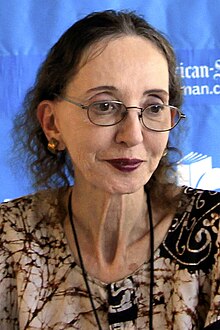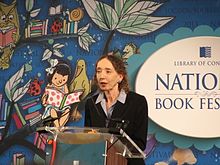Joyce Carol Oates
Appearance

Joyce Carol Oates (born June 16, 1938) is an American author who has published 58 novels, plays and novellas, as well as volumes of short stories, poetry, and nonfiction. Oates taught at Princeton University from 1978 to 2014 and is the Roger S. Berlind '52 Professor Emerita in the Humanities with the Program in Creative Writing. She is a visiting professor at the University of California, Berkeley where she teaches short fiction.
Quotes
[edit]


- Nothing is accidental in the universe — this is one of my Laws of Physics — except the entire universe itself, which is Pure Accident, pure divinity. So it cannot be an accident that I think of you so constantly.
- "The Summing Up: Meredith Dawe," Do What You Will (1970)
- Old women snore violently. They are like bodies into which bizarre animals have crept at night; the animals are vicious, bawdy, noisy. How they snore! There is no shame to their snoring. Old women turn into old men.
- "What Is the Connection Between Men and Women?" Mademoiselle (February 1970)
- It is not her body that he wants but it is only through her body that he can take possession of another human being, so he must labor upon her body, he must enter her body, to make his claim.
- "In the Founders’ Room," Unholy Loves (1979)
- If you are a writer you locate yourself behind a wall of silence and no matter what you are doing, driving a car or walking or doing housework — you can still be writing, because you have that space.
- The New York Times (27 July 1980)
- When people say there is too much violence in [my books], what they are saying is there is too much reality in life.
- The New York Times (27 July 1980)
- Our enemy is by tradition our savior, in preventing us from superficiality.
- As quoted in "Master Race," Partisan Review 50th Anniversary Edition (1985), edited by William Phillips
- When poets — write about food it is usually celebratory. Food as the thing-in-itself, but also the thoughtful preparation of meals, the serving of meals, meals communally shared: a sense of the sacred in the profane.
- "Writers’ Hunger: Food as Metaphor," The New York Times (19 August 1986)
- If food is poetry, is not poetry also food?
- "Writers’ Hunger: Food as Metaphor," The New York Times (19 August 1986)
- The television screen, so unlike the movie screen, sharply reduced human beings, revealed them as small, trivial, flat, in two banal dimensions, drained of color. Wasn’t there something reassuring about it! — that human beings were in fact merely images of a kind registered in one another’s eyes and brains, phenomena composed of microscopic flickering dots like atoms. They were atoms — nothing more. A quick switch of the dial and they disappeared and who could lament the loss?
- You Must Remember This (1987), pt. 1, ch. 13
- Prose — it might be speculated — is discourse; poetry ellipsis. Prose is spoken aloud; poetry overheard. The one is presumably articulate and social, a shared language, the voice of "communication"; the other is private, allusive, teasing, sly, idiosyncratic as the spider’s delicate web, a kind of witchcraft unfathomable to ordinary minds.
- "'Soul at the White Heat': The Romance of Emily Dickinson’s Poetry," (Woman) Writer: Occasions and Opportunities (1988)
- When you’re 50 you start thinking about things you haven’t thought about before. I used to think getting old was about vanity — but actually it’s about losing people you love. Getting wrinkles is trivial.
- Interview in The Guardian (18 August 1989)
- Homo sapiens is the species that invents symbols in which to invest passion and authority, then forgets that symbols are inventions.
- "The Calendar's New Clothes," The New York Times (30 December 1999)
- Constant interruptions are the destruction of imagination.
On Boxing (1987)
[edit]- I can entertain the proposition that life is a metaphor for boxing — for one of those bouts that go on and on, round following round, jabs, missed punches, clinches, nothing determined, again the bell and again and you and your opponent so evenly matched it’s impossible not to see that your opponent is you... Life is like boxing in many unsettling respects. But boxing is only like boxing.
- Boxing is about being hit rather more than it is about hitting, just as it is about feeling pain, if not devastating psychological paralysis, more than it is about winning.
- Boxing is a celebration of the lost religion of masculinity all the more trenchant for its being lost.
- The spectacle of human beings fighting each other for whatever reason, including, at certain well-publicized times, staggering sums of money, is enormously disturbing because it violates a taboo of our civilization. Many men and women, however they steel themselves, cannot watch a boxing match because they cannot allow themselves to see what it is they are seeing. One thinks helplessly, This can’t be happening, even as, and usually quite routinely, it is happening. In this way boxing as a public spectacle is akin to pornography: in each case the spectator is made a voyeur, distanced, yet presumably intimately involved, in an event that is not supposed to happening as it is happening. The pornographic "drama," though as fraudulent as professional wrestling, makes a claim for being about something absolutely serious, if not humanly profound: it is not so much about itself as about the violation of a taboo. That the taboo is spiritual rather than physical, or sexual — that our most valuable human experience, love, is being is being desecrated, parodied, mocked — is surely at the core of our culture’s fascination with pornography.
- In any case, raw aggression is thought to be the peculiar province of men, as nurturing is the peculiar province of women... The psychologist Erik Erikson discovered that, while little girls playing with blocks generally create pleasant interior spaces and attractive entrances, little boys are inclined to pile up the blocks as high as they can and then watch them fall down: "the contemplation of ruins," Erikson observes, "is a masculine specialty."
- Boxing has become America’s tragic theater.
- To be knocked out doesn’t mean what it seems. A boxer does not have to get up.
- [The] third man in the ring makes boxing possible.
- On the introduction of referees in the late 19th century
- Love commingled with hate is more powerful than love. Or hate.
Tavis Smiley interview (2005)
[edit]- Tavis Smiley interview, PBS (28 June 2005)
- Any number of definitions help to determine who we are. It doesn't hurt to be a woman writer, an American woman writer, American woman writer of the 21st century. I think all these descriptions of us — and they're descriptions and adjectives that pertain to you — none of them diminish you, really. I think that maybe there's a kind of deepening or expansion the more identifications you have.
- The written word, obviously, is very inward, and when we're reading, we're thinking. It's a sort of spiritual, meditative activity. When we're looking at visual objects, I think our eyes are obviously directed outward, so there's not as much reflective time. And it's the reflectiveness and the spiritual inwardness about reading that appeals to me.
Address at Mount Holyoke College (2006)
[edit]- It's one of those secrets that's embarrassing to acknowledge, but we do love our students.
- Very few writers of distinction in fact were outstanding as undergraduates.
- There is the expectation that a younger generation has the opportunity to redeem the crimes and failings of their elders and would have the strength and idealism to do so.
- At a time when politics deals in distortions and half truths, truth is to be found in the liberal arts. There's something afoot in this country and you are very much a part of it.
Joyce Carol Oates interviews herself (2013)
[edit]
- We all have numerous identities that shift with circumstances. The writing self is likely to be a highly private, conjured sort of being — you would not find it in a grocery store.
- If I’m required to identify myself on a form, I write “teacher.” I’ve been a teacher almost as long as I’ve been writing. [Pause.] I think of myself less as a writer than as a person who writes — or tries to. Each morning is a kind of obstacle course in which the obstacles seem to have all the advantage.
- Any kind of creative activity is likely to be stressful. The more anxiety, the more you feel that you are headed in the right direction. Easiness, relaxation, comfort — these are not conditions that usually accompany serious work.
- The writer is a “somewhat mystical” — or do I mean “mythical”? — person.
- Writers and artists never pay attention to advice given by their elders, quite rightly. The only worthwhile advice is the most general: Keep trying, don’t give up, don’t be discouraged, don’t pay attention to detractors. Everyone knows this.
- My theory is that literature is essential to society in the way that dreams are essential to our lives. We can’t live without dreaming — as we can’t live without sleep. We are “conscious” beings for only a limited period of time, then we sink back into sleep — the “unconscious.” It is nourishing, in ways we can’t fully understand.
- I think that art is the commemoration of life in its variety. The novel, for instance, is “historic” in its embodiment in a specific place and time and its suggestion that there is meaning to our actions. Without the stillness, thoughtfulness and depths of art, and without the ceaseless moral rigors of art, we would have no shared culture — no collective memory. As it is, in contemporary societies, where so much concentration is focused on social media, insatiable in its myriad, fleeting interests, the “stillness and thoughtfulness” of a more permanent art feels threatened.
External links
[edit]- Celestial Timepiece: A Joyce Carol Oates Patchwork (Official Web Site)
- The Glass Ark: A Joyce Carol Oates Bibliography
- Ontario Review
- Papers of Joyce Carol Oates at Syracuse University
- Interview with the Oxonian Review in June 2010
- Joyce Carol Oates Bookworm Interviews (Audio) with Michael Silverblatt
- Interview October 13, 2015 WNYC Leonard Lopate show
Categories:
- 1938 births
- Living people
- Academics from the United States
- Novelists from the United States
- Poets from the United States
- Short story writers from the United States
- Essayists from the United States
- Playwrights from the United States
- Women authors
- Critics from the United States
- Educators from the United States
- Atheists from the United States
- Humanists
- Women from the United States
- People from Buffalo
- Women journalists
- Women born in the 1930s


